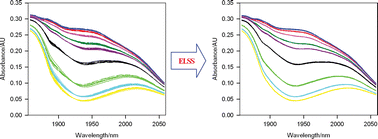Improving the linearity of spectroscopic data subjected to fluctuations in external variables by the extended loading space standardization†
Abstract
In process analytical applications, spectral measurements can be subject to changes in process temperature, pressure, flow turbulence, and compactness as well as other external variations. Generally, the variations of external variables influence spectral data in a non-linear manner which leads to the poor predictive ability of bilinear calibration models on raw spectral data. In this contribution, the influence of external variables on spectral data is generally classified into two different modes, multiplicative influential mode and composition-related influential mode. A new chemometric method, termed Extended Loading Space Standardization (ELSS), has been developed to explicitly model these two kinds of influential modes. ELSS was applied to two sets of spectral data with fluctuations in external variables and its performance evaluated and compared with global partial least squares (PLS) models and Loading Space Standardization (


 Please wait while we load your content...
Please wait while we load your content...